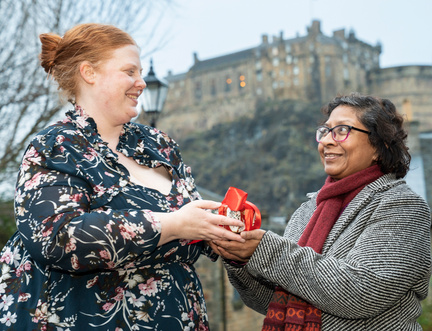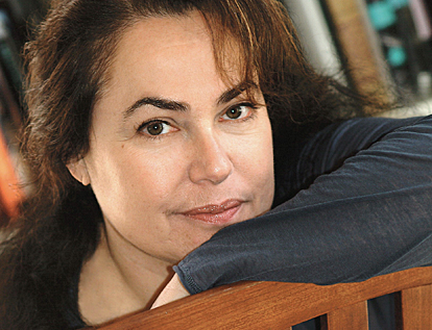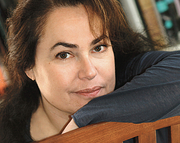Take Route Six to the Ocean
By Amy Bloom
We have commissioned a new piece of writing from fifty leading authors on the theme of 'Elsewhere' - read on for Amy Bloom's contribution.
Provincetown is a small town on a sand-bar in Massachusetts. On one side is the harbor, on the other side the dunes and the ocean. Thoreau wrote that it was “a filmy sliver of land lying flat on the ocean, a mere reflection of a sand-bar on the haze above.” It hasn’t changed much in 150 years, geographically. The Pilgrims have come and gone (pretty quickly—they wintered in Provincetown and went on to Plymouth). The Portuguese fishermen and their families have been in town since whaling ended more than a century ago and fishing began and they are there still, although the fishing isn’t great anymore. (You can whale-watch, however, or hire someone to take you fishing for a day and catch bluefish and striped bass, while watching out for the pleasure of seals and the annoyance of drunks in motorboats.) The painters and poets and novelists came and stayed, from Robert Motherwell and Norman Mailer to people who post their rhyming poems in the back of the pizza parlor or paint on cardboard because they can’t afford canvas. Gay artists came with their straight siblings, and once the artists and their shifty, sexy ways cleared a path, gay accountants, gay plumbers, gay businessmen, gay schoolteachers, gay waiters and gay electricians began arriving. They, too, have stayed. And the handsome, muscular guys, all dressed like oversized toddlers, and the swaggering butches, and the two moms and two dads with two kids, and the boa-wearing queens, and the sulky teenagers all flood Commercial Street, moving like a motley wave around the German tourists and the straight families from Idaho, all of whom want their picture taken with the Cher lookalike on a scooter.
You can’t buy a basic pair of pants or a plain button-down shirt in P-town. But you can buy:
Really good oysters. (You can even just get a bucket and drive over to the Wellfleet flats and dig your own.)
A huge, wall-covering oil painting of a man with enormous green eyes, done by a local artist, inspired by Jacques-Louis David’s Leonidas at Thermopylae.
A hammock woven in rainbow colors.
Custom-made stained glass in the manner of Frank Lloyd Wright or Andy Warhol.
A Japanese teapot made into a vase.
Caramel cheesecake saltwater taffy.
An antique cabinet from the Gansu Province of China, circa 1850.
Lemon grass bath salts.
A superb one-hour massage with a transgendered body-builder.
Cranberry-walnut fudge.
A diamond-studded vibrator.
Blueberry-banana gelato and a blue striped sundress to go with it.
A straw fedora with a black and red grosgrain ribbon. (Men will look dashing; women, insouciant.)
A La Vie Boheme t-shirt. (Also one that says Your Gaydar Should Be Going Off Right…Now.)
An elaborately pretty (or suitably manly) henna tattoo that will last two weeks and make the middle-aged feel that life has not entirely passed them by.
Home-made brownies, $1 apiece, sold by the two little girls on the corner, in front of their house.
When I was growing up, my parents took me on exactly three vacations. The first was to my Uncle Izzy’s chicken farm in New Jersey. I got bitten by a chicken and had to carry warm, dampish eggs to the kitchen. After making scrambled eggs, my aunt stepped a few yards behind the house and killed a chicken for dinner. She wore her blood-spattered apron all day. The second holiday, we went to a cottage on the Jersey shore. It had no indoor plumbing, no air-conditioning and no window screens. I got a rash that lasted for weeks. The third time, we went to Puerto Rico; I was 13, my sister was 18, and on the first day we disappeared for 8 hours to go joyriding with a pair of good-looking thugs. When we got back, the Puerto Rican State Police surrounded us and then we went home. That was it for family vacations.
I was determined to give my children the holidays I didn’t have (funky charm, social diversity, bookstores and toilets) and I was determined not to be one of those miserable brood-bound souls shlepping whiny children to places they didn’t want to go, ending with a dropped ice cream cone for them and a drinking problem for me.
Provincetown is our place; heaven for them, and heaven for me. We drive up narrow Route 6 and there are the dunes and sky, undulating elegantly on our right. It doesn’t look like what it is—the slow, destructive process of erosion. It looks like the world before people tarted it up. On our left are the small seashore cabins, which we’re happy not to stay in. They’re close to the dunes but have Route 6 passing right in front of, and behind, them. We pull into town and head east. We can stop at the supermarket at which everyone (drag queens, famous designers, tattoo artists, Provincetown’s mayor) shops and, amid the grandmothers in outrageous t-shirts and adopted Chinese toddlers and visiting European teenagers dressed for St. Tropez, we buy vacation food. Lucky Charms cereal and peanut butter. This for the gluten-free, that for the lactose-intolerant. Diet Coke and blueberries for everyone. An inflatable raft it will take an hour to blow up.
From time to time we have stayed in Provincetown’s inns (from the oddly ornate, full of damask and brocade, to the bravely threadbare with mismatched pillowcases and broken dressers) but when the guys we loved sold The Commons to open a hotel in Florida, and the tiny blue attic bedroom was no longer available for my youngest daughter, we moved on to renting a house.
The beach on the bay side spreads out toward the long arm and fist of Provincetown, the true land’s end, and south towards the more polite and tidy Wellfleet. (No tawdry shops with giant sunglasses, bejeweled flip-flops and hair clips shaped like naked women.) You can walk out nearly a half mile at low tide, and we do. My daughters do the water tricks they have been performing in the bay for twenty years—handstands and cartwheels—and they do them for their niece who, at two, is fascinated but wary. We all walk down Commercial Street for pizza and ice cream at Spiritus. We go to Tom’s Used Books (but only four at a time—it’s not very big). We all return to the beach, hour after perfect hour. A Brazilian couple, darkly tanned and glittery in their tiny white suits, walk their tiny white bichon past us and then retreat to their muslin tent. The two older ladies bring their complete kit for the afternoon—iced tea, two crystal glasses and a tray of lemon squares. A family of three blond parents and four brown children fly a pair of kites. An old man in a sarong and a pith helmet comes by with his metal detector. The sun sets like a wide red hibiscus over the water and all of those people stop and watch it blossom and drop.
“Hallelujah,” the old man says.
***
Copyright © 2010, Amy Bloom. All rights reserved.
Supported through the Scottish Government’s Edinburgh Festivals Expo Fund.
Look, Listen & Read
- 2025 Festival:
- 9-24 August
Latest News
 Communities Programme participants celebrate success of 2024
Communities Programme participants celebrate success of 2024





